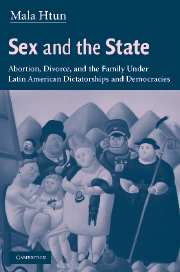 Sex and the State
Sex and the State Published online by Cambridge University Press: 08 January 2010
One of the more contentious developments of modern politics is the claim of the state to regulate family life and gender relations. How and on what grounds should states organize the rights of parents over children, allocate property within marriage, offer the possibility of and grounds for divorce, and allow women the choice to terminate a pregnancy? In most countries around the world, laws on these issues historically conformed to religious and patriarchal models. State policy granted men almost complete power in the family and limited citizen discretion over decisions about marriage and reproduction. Between the 1960s and the 1990s, the rise of the feminist movement brought new ideas about women's roles, while changes in social practices and the consolidation of democratic politics put pressure on old laws. Lawyers, feminist activists, and liberal and socialist politicians organized to demand reform of laws on family equality and divorce; many also favored decriminalizing abortion. Some states introduced major liberalizing changes in what Glendon has called “the most fundamental shift since family law had begun to be secularized at the time of the Protestant Reformation” (1987: 63). Other countries continued to uphold restrictive laws, often stressing the importance of traditional gender norms to cultural integrity and national identity.
This book studies the experiences of Argentina, Brazil, and Chile during the last third of the twentieth century to understand how and why states make decisions about policy on gender issues.
To save this book to your Kindle, first ensure no-reply@cambridge.org is added to your Approved Personal Document E-mail List under your Personal Document Settings on the Manage Your Content and Devices page of your Amazon account. Then enter the ‘name’ part of your Kindle email address below. Find out more about saving to your Kindle.
Note you can select to save to either the @free.kindle.com or @kindle.com variations. ‘@free.kindle.com’ emails are free but can only be saved to your device when it is connected to wi-fi. ‘@kindle.com’ emails can be delivered even when you are not connected to wi-fi, but note that service fees apply.
Find out more about the Kindle Personal Document Service.
To save content items to your account, please confirm that you agree to abide by our usage policies. If this is the first time you use this feature, you will be asked to authorise Cambridge Core to connect with your account. Find out more about saving content to Dropbox.
To save content items to your account, please confirm that you agree to abide by our usage policies. If this is the first time you use this feature, you will be asked to authorise Cambridge Core to connect with your account. Find out more about saving content to Google Drive.